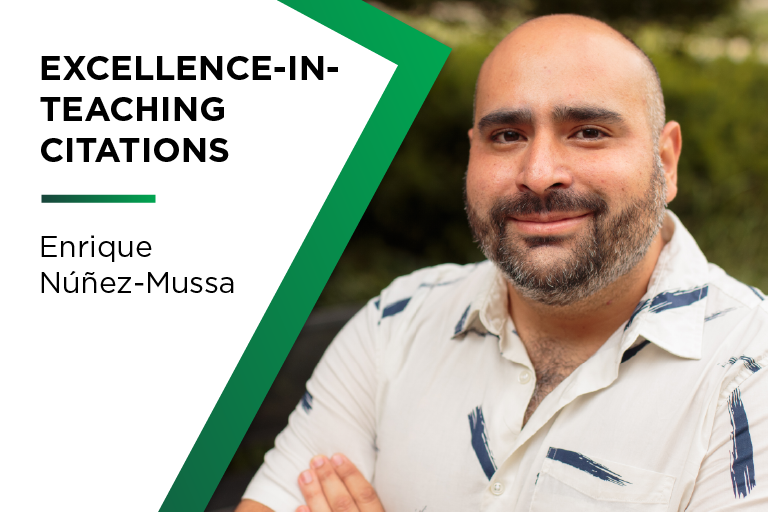Enrique Núñez-Mussa, a third year Information and Media Ph.D. student in the School of Journalism, has been awarded the 2024 Excellence-In-Teaching Citations. The award is made to six graduate teaching assistants “who have distinguished themselves by the care they have given and the skill they have shown in meeting their classroom responsibilities.”
A native of Chile, Núñez-Mussa has been an instructor at MSU since 2022. He has taught both practical and conceptual classes in visual storytelling and photojournalism. But it was his love of writing that guided the first steps of his career.
“I always wanted to be a reporter,” Núñez-Mussa said. “Academia wasn’t what I thought was going to be my most natural path. But it just ended up happening quite organically.”
Núñez-Mussa studied journalism at Pontifical Catholic University in Santiago. After graduation, he took an internship with the local edition of Rolling Stone. It was a time when the traditional print magazine industry was being phased out in favor of online media.
“So, there wasn’t much future there,” Núñez-Mussa said.
But his old school had a new opportunity. Pontifical Catholic University had a newspaper which had just partnered with MSN and had transitioned to digital. When its editor-in-chief left the school, Núñez-Mussa took over. His position required him to teach an editing class. He became a teacher in 2012 and fell in love with the profession.
Núñez-Mussa came to Michigan State University to pursue his doctorate. An avid photographer, he was invited to teach a visual literacy class. It proved to be an enriching experience.
“It’s an area I love and consider of utmost relevance in today’s information consumption landscape,” Núñez-Mussa said. “It has also allowed me to work on nurturing the talent of students passionate about photography and fostering critical reflections on the subject.”
Núñez-Mussa is always conscious of keeping his students engaged. Over time, he’s developed some techniques that have built his instructional style.
“I started challenging myself, thinking ‘how can I get the students to learn this and acquire the concept without me explaining everything?’ he said. “I start with a short lecture, usually 15 to 20 minutes, where I provide examples and the main ideas behind the concept. And then for the rest of the class, I create teaching experiences. I design games, exercises and simulations so I can see how the students are interacting with each other and the content.”
As Spanish is his first language, it took some adjustment for Núñez-Mussa to teach in the U.S., he says, and to learn a different academic culture. Aware of his own speech patterns, Núñez-Mussa took extra measures to ensure his students were engaged.
“When I first taught classes, I would record myself to see in which moments I lost cadence,” he said. “It’s like riding a bicycle. At the beginning of each semester, I’m slower, and at the end of the semester, after teaching several classes, I’m more fluent.”
Those early efforts, coupled with his classroom innovations, have not gone unnoticed. Already the winner of two national teaching awards, Núñez-Mussa is active in presenting his pedagogical innovations in juried national and regional teaching competitions. Reviewers cite imaginative assignments that give students a chance to demonstrate their mastery of what they have learned. He is lauded for creating clear, creative, and challenging learning experiences. For those reasons, Núñez-Mussa will be formally presented with the Excellence-In-Teaching Citation on May 1.
“It’s a recognition of a style of teaching that I see as very conversational,” Núñez-Mussa said. “It gives a lot of agency to the students, making them part of the decisions we make together in class. It’s an approach where the class is built between us. I think that’s where you learn the most, rather than being afraid of what the professor will think or how the professor will assess what you’re saying or doing.”
The award is also sure to make a positive impact on Núñez-Mussa’s career, as he prepares to start the final year of his doctoral program in September.
By Kevin Lavery
